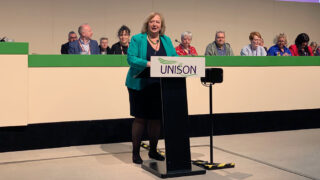The government could ease the social care crisis by handing councils back billions in surplus cash raised from business rates, says a report published today (Wednesday) by UNISON.
The government expects to receive a £2.4bn windfall from business taxes next year, and for the two subsequent years. This is because it now receives more in business rates from English local authorities* than it pays out to them in revenue support grant.
UNISON’s report Investing in Social Care says this £2.4bn growth in business rates ‘surplus’ has yet to be allocated for specific spending by ministers. Investing it in social care would be the best possible use of the money for those in need of support, the homecare workforce and the NHS, says UNISON.
Cuts to local government spending have meant a reduction in older people receiving home care, a fall in the number of day care places and in meals-on-wheels services, all of which is putting huge pressure on the already stretched NHS, says UNISON.
Local council taxpayers would also benefit too, according to the report. If local authorities in England were given an extra £2.4bn, it would remove the need for the two per cent council tax precept, says UNISON.
Last April English councils were allowed to raise extra cash from council taxpayers to spend on social care. But this money doesn’t go where it is needed most, and elderly people in deprived areas lose out, says UNISON.
UNISON general secretary Dave Prentis said: “The social care system is in dire straits. There’s simply not enough money to fund the care that’s needed.
“The losers are the thousands of dedicated homecare workers, who work long hours, and whose already low wages are dragged below the legal minimum because of the non-payment of travel time.
“Those suffering the most are the elderly and the disabled, who rely on daily visits so they can stay in their own homes. Visits are often too short to administer the care needed, or care packages simply aren’t available. Then people have to stay in hospital far longer than is good for them, in beds that are desperately needed for other patients.
“Investing £2.4bn in social care would be money extremely well spent. Not only would it mean better care for the elderly, it would ease the pressure on homecare staff, and free up beds in the NHS.”
Ahead of next week’s autumn statement, Dave Prentis has written to Philip Hammond setting out other areas where the autumn statement could make a real difference to public services. The Chancellor could:
- End public service job cuts, where fewer staff are trying to do more with less resources.
- Fully fund student nurse bursaries, giving the NHS a better chance of recruiting the additional health professionals it needs.
- End the one per cent public sector pay cap, which has caused money worries for many public servants.
Notes to editors:
– UNISON’s report Investing in Social Care is available here.
– This week UNISON has paid for a series of advertisements highlighting the risks posed by cuts and urging the public to appeal to the Chancellor to change direction on public spending.
– *This is only applies in England because there is no central surplus of business rates in Wales or Scotland.
– In the 2015 spending review George Osborne allowed local authorities to increase council tax by an extra two per cent a year, if it was spent on social care. But it means councils in richer areas raise more money. For example, Hackney has a social care budget of £65m and can raise £1.3m, whereas Richmond upon Thames has a budget of £65.6m and gets £2.2m from the precept.
– Last week UNISON released a report saying that vulnerable older people were being denied regular showers and visits to the toilet because of cuts to social care budgets. UNISON’s Save Our Local Services (SOS) campaign aims to raise awareness of spending cuts and their impact on communities and the staff employed across our public services. Today (Wednesday) MPs will be asked to pledge support for the campaign at an event at Portcullis House, Westminster from 12.45 to 2pm.
Media contacts:
Alan Weaver T: 0207 121 5555 M: 07939 143310 E: a.weaver@unison.co.uk
Sophie Goodchild T: 0207 121 5546 M: 07767 325595 E: s.goodchild@unison.co.uk


